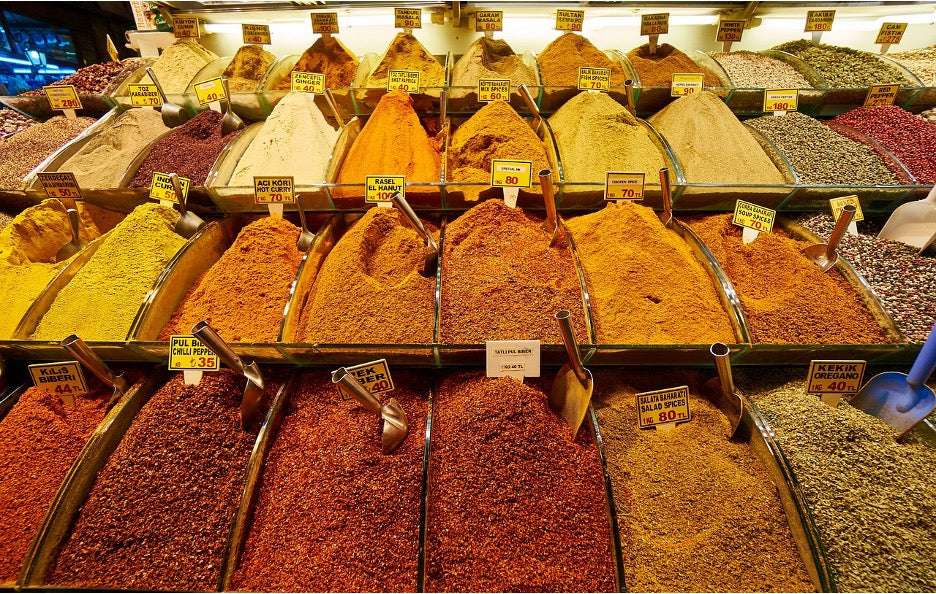
The Wholesome Chef: What Are Some of the Healthiest Spices?
Share
Many of the healthiest spices, like oregano and parsley, are packed with vitamins and antioxidants and, when taken in the right potencies, promise a variety of health benefits. Since at least 3000 BC, people have experimented with herbs and spices in an effort to pinpoint medicinal benefits. Even now, with advanced research capabilities, we’re discovering unexpected properties that have long-term positive effects on our bodies. We’ll start with a list and give you the deets as we go.
What Are Some of the Healthiest Spices?
- Paprika
- Turmeric
- Cinnamon
- Rosemary
- Ginger
- Garlic
- Parsley
- Cayenne Pepper
- Cumin
- Thyme
- Oregano
- Fennel
1. Paprika
Paprika, made from ground peppers, is a versatile spice known for its vibrant color and subtle smoky flavor. Rich in antioxidants, including vitamin C and carotenoids, paprika has been shown to support eye health and promote immune function. Studies suggest that the capsaicin in paprika may help reduce inflammation and improve blood circulation, which can aid in heart health. Additionally, paprika has been studied for its potential to regulate blood sugar levels, making it a valuable addition for managing diabetes and promoting overall wellness.
2. Turmeric
Turmeric, primarily known for its active compound, curcumin, offers remarkable anti-inflammatory and antioxidant properties and is widely considered one of the healthiest spices known to science. A 2017 study confirmed tumeric’s role as a preventative agent for a wide range of chronic diseases such as heart issues and Alzheimer's. And its ability to regulate neurological factors has been linked to improved brain function and a lower risk of brain diseases.
3. Cinnamon
Cinnamon has been studied extensively for its powerful medicinal properties, chiefly its impact on blood sugar levels. It acts by increasing insulin sensitivity and has been shown in numerous studies to lower fasting blood sugar levels. Additionally, cinnamon's antioxidant has been shown to help fight inflammation and is associated with reduced risk of heart disease.
4. Rosemary
Rosemary is known for its fragrant, pine-like aroma, but its health benefits are just as impressive. Rich in antioxidants like rosmarinic acid, rosemary has been studied for its ability to enhance memory and concentration. In large amounts, its anti-inflammatory properties make it effective in reducing pain and swelling, while its antimicrobial compounds help protect the body from infections. Additionally, rosemary may aid in digestion by stimulating the production of bile, promoting smoother digestion, and reducing indigestion symptoms.
5. Ginger

Ginger has anti-nausea, digestive, and anti-inflammatory effects. Studies have shown that ginger can significantly reduce symptoms of nausea, especially related to pregnancy and chemotherapy. Its anti-inflammatory properties make it beneficial in managing osteoarthritis and reducing muscle pain after intense physical activity. All of these attributes make Ginger one of the healthiest spices for addressing short-term symptoms of underlying conditions.
6. Garlic
Garlic has been used for centuries to fight infections and boost the immune system, earning its place as one of the top healthiest spices. Modern research supports its benefits, showing that garlic supplementation can reduce the incidence of the common cold. Additionally, garlic has a significant impact on reducing blood pressure and cholesterol levels, factors associated with heart disease risk.
7. Parsley
Parsley, often seen as just a garnish, is actually a nutritional powerhouse with numerous health benefits. Its abundance of vitamins A, C, and K, make it a healthy ally in supporting immune function, promoting healthy skin, and aiding in bone health. Vitamin C, for instance, is a potent antioxidant that helps combat free radicals, reducing inflammation and lowering the risk of chronic diseases. Additionally, vitamin K plays a crucial role in blood clotting and bone metabolism, helping to maintain strong bones and prevent fractures.
8. Cayenne Pepper
Capsaicin, the active component in cayenne pepper, is known for its metabolism-boosting properties. It aids in weight loss by increasing the amount of heat your body produces, leading to more calories burned per day. Additionally, capsaicin has been shown to reduce hunger, helping in appetite control.
9. Cumin

Cumin is widely recognized for its digestive benefits. Research has shown that it increases the activity of digestive enzymes, potentially speeding up digestion. Studies have also shown that cumin can improve symptoms of irritable bowel syndrome (IBS), such as stomach pain and bloating. Cumin's impact on improving blood cholesterol levels is also notable.
10. Thyme
Thyme is celebrated not only for its aromatic qualities but also for its impressive medicinal properties. Thymol, the active compound in thyme, has been shown to have powerful antimicrobial and antioxidant effects. This makes thyme an excellent spice for supporting respiratory health and fighting off infections. Research has linked thyme to reduced inflammation and improved cardiovascular health, making it a valuable addition to heart-healthy diets. Its high vitamin C content also supports immune system function and wound healing.
11. Oregano
Rich in antioxidants, particularly thymol and carvacrol, oregano has been studied for its ability to help protect the body from oxidative stress and inflammation, which are linked to chronic diseases such as heart disease and cancer. These compounds also have potent antimicrobial properties, making oregano an effective natural remedy for fighting off bacterial and viral infections. Additionally, oregano provides vitamins A, C, and E, which support immune function and skin health.
12. Fennel

Fennel, admired for its licorice-like taste, has been shown to possess strong anti-inflammatory and antibacterial properties. It is particularly effective in digestive health, alleviating symptoms like bloating, gas, and constipation.
From reducing the risk of chronic illnesses, like heart disease and diabetes, to aiding in digestion and boosting mental health, the healthiest spices offer a holistic approach to wellness. Incorporating these spices into daily diets can help support health improvements, underlining the importance of dietary choices in enhancing overall well-being. As research continues to evolve, the potential for discovering even more benefits of these and other spices remains promising.
